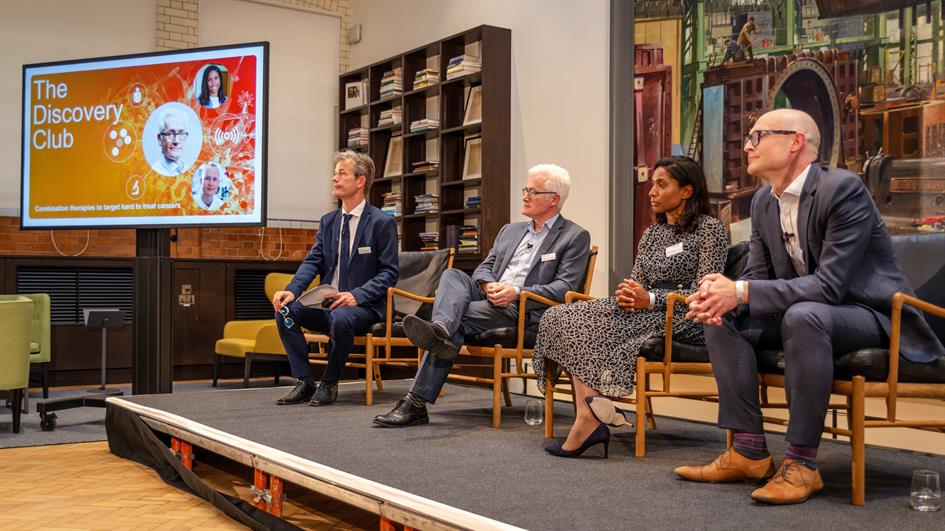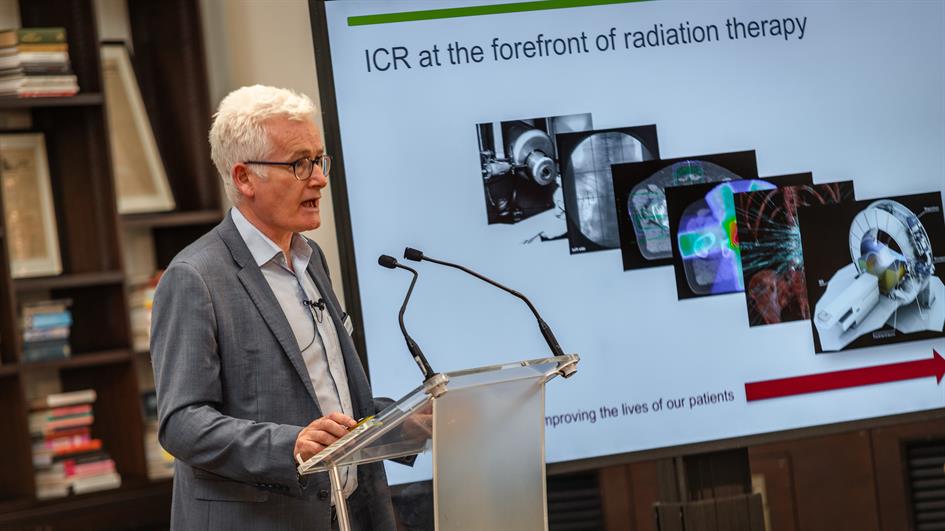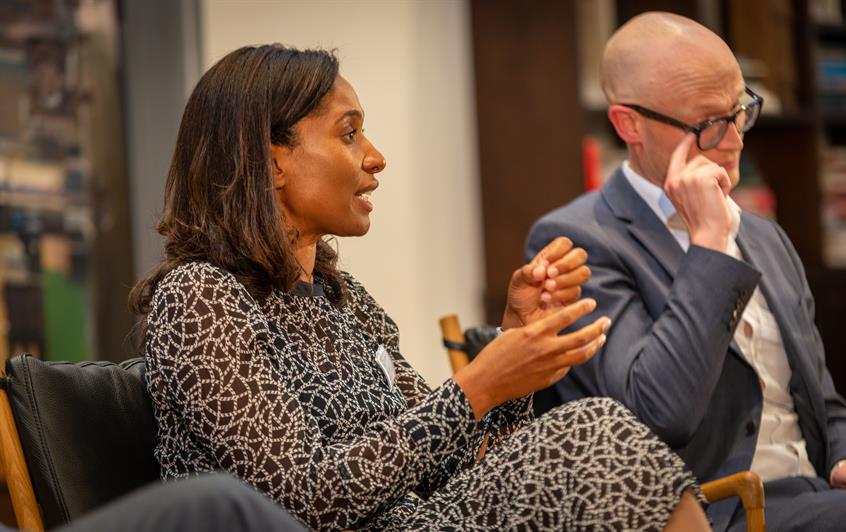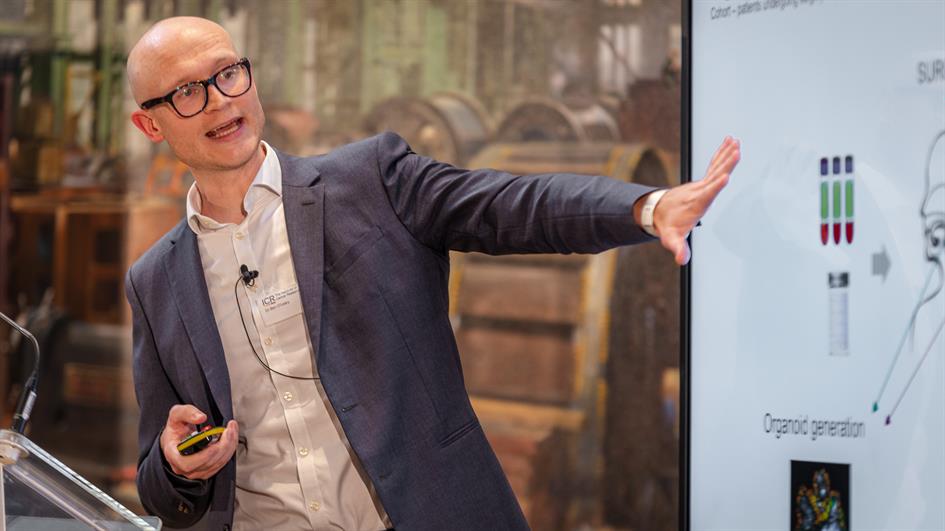
Image: From left to right: Professor Kristian Helin, Professor Kevin Harrington, Dr Julia Murray and Dr Ben O'Leary.
Discovery Club members gathered at the Science Museum in London to learn how our researchers are transforming cancer care for patients with innovative combination therapies.
The 8 June event, also offered an exclusive opportunity to view the new ‘Cancer Revolution: Science, innovation and hope’ exhibition, and meet some of our scientists who were involved.
Throughout the evening, guests heard how our researchers are working together to understand the interactions between radiotherapy, immunotherapy and chemotherapy to develop kinder and smarter treatments.
Professor Kevin Harrington, Head of the Division of Radiotherapy and Imaging at the ICR, opened the evening and then introduced clinician scientists Drs Julia Murray and Ben O’Leary who spoke about how they are translating their research to benefit cancer patients.
The radiotherapy revolution

Image: Professor Kevin Harrington at the Discovery Club event held at the Science Museum.
Radiotherapy has revolutionised cancer care and is the most effective way of treating cancer other than surgery. Newer immunotherapies, drugs that stimulate the immune system to attack cancer, are also transforming how we treat cancers. Research suggests that by combining radiotherapy with immunotherapy could prove a highly potent mixture, improving our ability to eliminate hard-to-treat cancers.
Tracing the progress from X-ray to CT scans through to intensity-modulated and stereotactic radiotherapy, Professor Harrington said: “From its humble beginnings with very crude technology some 70-80 years ago, the ICR and The Royal Marsden have been at the very heart of every major advance in radiotherapy.”
More recently, the ICR has been part of a global consortium leading investigations around the use of the MR Linac, endeavouring to deliver more personalised and targeted treatment.
Through a Cancer Research UK grant initiative, RadNet and further partnership funding, we have developed a scientific research programme to understand how the immune system affects cancer’s response to radiotherapy, developing and testing new combinations of drugs, including immunotherapies, with radiotherapy and investing in the next generation of clinician scientists.
Helping hard-to-treat prostate cancer patients

Image: Dr Julia Murray at the Discovery Club event help at the Science Museum.
Dr Julia Murray is a Consultant Clinical Oncologist at The Royal Marsden NHS Foundation Trust and Clinical Senior Lecturer at the ICR.
She leads the Cancer Research UK-funded PEARLS trial, which is looking at how to use targeted radiotherapy for node-positive prostate cancer patients. Node-positive prostate cancer patients are considered to have advanced cancer but the optimal strategy to treat this group of patients with radiotherapy has not previously been investigated.
The PEARLS study aims to recruit initially 150 patients across 20 centres in the UK and then after initial review of side effects with this new technique of extending the field of radiotherapy, will hopefully expand recruitment globally for an additional 743 patients. The aim of the study is to show that targeted extended field radiotherapy could help to better treat these patients and even extend the window of ‘cure’ for this typically hard-to-treat group.
Dr Murray hopes that this trial could show the potential of radiotherapy to become as a universal standard of care with systemic therapy for node-positive prostate cancer.
Evolution and treatment resistance in head and neck cancer

Image: Dr Ben O'Leary at the Discovery Club event held at the Science Museum.
Dr O'Leary is a Clinician Scientist at the ICR and a Consultant Clinical Oncologist at The Royal Marsden, working in the Molecular Oncology team. His research focuses on the role of cancer evolution in resistance to cancer therapies in breast and head and neck cancers.
Drawing on Darwinian theories of evolution, Dr O’Leary and his team are looking at what happens to cancer cells undergoing combination therapies, particularly surgery and radiotherapy. By studying genetic changes through genomic sequencing, his team can map out new treatments depending on what path cancer evolves along. As well as using tissue biopsies, in many patients with cancer it is possible to use a liquid biopsy to pick up traces of the cancer's DNA (ctDNA) from a blood sample. New technologies allow us to detect and characterise this ctDNA to learn about a particular patient's cancer and how they might response to treatments.
Dr O’Leary is currently leading the ORIGINS study, exploring evolution in the combined treatment of surgery and radiotherapy for patients with head and neck cancers, and the DART study, which looks at patients receiving immunotherapies for metastatic or recurrent head and neck cancers and how their genomes and changes in their ctDNA might influence treatment.
Help us continue our vital research
Speaking at the event, Professor Kristian Helin, Chief Executive of the ICR, highlighted new research and progress to patients – much of which would not be possible without philanthropic support and generosity.
He shared how our largest ever donation has enabled us to establish a new Centre for Protein Degradation. The centre will allow us to accelerate our research into targeted protein degradation – to discover new research tools and new treatments for hard-to-treat cancers that can work highly precisely.
Our Discovery Club members are part our generous community of donors, who help us to drive forward our research. Focused philanthropic investment in key organisational priorities, ensures that new discoveries are brought rapidly into the clinic to benefit patients.
This event is part of a series to update members on our science and show them how their support is making an impact.
Hannah Joyce, Deputy Director of Development (Philanthropy), said: “It was wonderful to see so many of our donors in-person once again. The event was the most well-attended event since the pandemic and a huge success. We are incredibly grateful for the generosity of our donors which enable us to continue with so many important fields of study into combination therapies to tackle hard-to-treat cancers.”
If you know any individuals who might be interested in becoming Discovery club members, please contact Hannah Joyce, Deputy Director of Philanthropy.
Philanthropic donations can make a transformational difference to our cancer research and help improve the lives of people with cancer.
Find out more about philanthropy